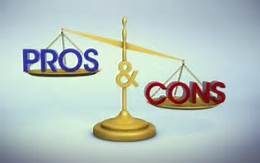
The decision to file bankruptcy requires consideration of the pros and cons. My new debt resolution comparison chart is a good place to start when considering the alternatives, and whether bankruptcy is the best fit. There are certain negative ramifications of filing bankruptcy, which need to be considered.
I recently came across an article called “3 Consequences of Declaring Bankruptcy That You May Not Be Aware Of”. It’s from a blog called the Motley Fool, and rightly so as it’s pretty foolish. The 3 consequences are that it costs money to hire an attorney, it will affect your credit, and some debts such as child support, student loans, and taxes will not be discharged. I think 98% of the people that I talk to, already know these things, but I will discuss them a bit.
The attorney’s fees are usually a drop in the bucket compared to the amount of debt that people are discharging. Some people actually call me, with only $3,000-$4,000 in dischargeable debt, and even though there is not a legal minimum amount of debt required to file bankruptcy, I simply tell them that that’s not enough to file bankruptcy upon. For a quote on the fees in your case, you should call me, or you can fill out my 60 second questionnaire.
As far as the effect on a person’s credit, first of all, most people’s credit is already shot before they come to see me. For others, who have good credit but bad debt, the inability to continue making payments in good standing is usually a time bomb waiting to go off. Even though a bankruptcy is on your credit for 10 years, you can get credit cards and car loans right after a bankruptcy (albeit at higher interest rates), it takes about three years to qualify for a mortgage. Check out this prior blog post on how bankruptcy affects the credit score.
As far as the third point, some taxes are actually dischargeable. I often see people with an overwhelming amount of student loan debt, and a relatively small amount of credit cards. Sometimes we just get rid of the credit cards because they can easily get that out of the way, and then focus on paying off student loans.
Of these top three consequences, I am surprised that the number one consequence in my opinion, i.e. turnover of potential nonexempt assets, was not mentioned. Chapter 7 bankruptcy is also called liquidation. An entity is created upon filing called the bankruptcy estate, and a trustee gets appointed to liquidate nonexempt assets, and pay them to creditors. Under Minnesota’s liberal exemption laws, which permits utilization of federal exemptions, 95% of people debtors, with good representation, will not need to pay anything to the bankruptcy estate. And those who do can legally minimize what they might need to turn over, with competent advice for legal prebankruptcy asset planning. Sometimes, nondischargeable debt such as taxes just end up getting paid in any way, so it is kind of like taking money out of your left pocket and putting it back into your right pocket. Sometimes the decision to file chapter 13 is preferable in an asset case. A competent attorney can help you make these decisions.
If I was going to make a list of the top three consequences that people don’t think about, in addition to the assets, there would be the ramifications of not telling the truth, which could mean not only denial of the discharge, but also present time, as they perceive schedules are signed under penalty of perjury, and lying under oath is a felony. In the other a consequence would be the fact that a chapter 7 may not go through if you have sufficient disposable income, and/or are above the median income and cannot beat the means test.

